
by Mirjam | Jan 18, 2016 | 2016, Childhood, Europe, Life Lesson, Netherlands
 I used to visit the library every chance I had. It was my favorite place in the world. I loved its quiet atmosphere, the air thick and warm with stories, knowledge, wisdom, all ready to be discovered in hundreds of books.
I used to visit the library every chance I had. It was my favorite place in the world. I loved its quiet atmosphere, the air thick and warm with stories, knowledge, wisdom, all ready to be discovered in hundreds of books.
And oh, the smell. I loved walking through those endless-looking shelves filled with books waiting to be read. I was a fast reader, and devoured books as if I was a hungry predator. I was always looking for a new book to read.
The selection of books was a meticulous process. I’d browse through the youth section of the library, searching for the perfect choice. I would take a book out and put it back, carefully study book covers and read the information on the back. I was very picky about the cover. The cover had to be pretty. If I wasn’t feeling it, I wasn’t reading it. If I didn’t like the cover, I wouldn’t even flip the book over to read the back. I was never going to read an ugly book.
The downside to being a fast reader and a picky book picker was that after a few months there were no more books to read.
No books with pretty book covers that is. Hesitantly I started perusing the youth section again, this time going for second best. I read Roald Dahl’s The Giant Peach, the one Roald Dahl book I had neglected to read because I didn’t like the cover.
I vividly remember how much fun I had reading that book. After that, I discovered one surprising book after another. They all revealed content that I never would have guessed from looking at the cover alone.
One day I read The Blooming Mimosa Tree by Gerda van Cleemput. For months I had kept putting the book back on the shelf because of its hideous cover. When I finally read it, it blew me away. The book told the life story of Helen Keller. I was intrigued and found my first real hero. I cried with her disappointments, cheered with her victories. When I had to walk down the stairs I closed my eyes and tried to find my way in the dark. I sat on my bed trying to imagine the sweet smell of mimosa flowers.
The book left a huge impression on me. It taught me the meaning of the word “perseverance”.
Yes, I learned a valuable lesson at that young age. I am wired to react to visuals, and I’m naturally drawn to pretty things. I guess we all are to some extent. We let our eyes guide us and motivate who or what to choose and how to judge. And by doing so we miss out on inspiring people, fabulous places and great experiences.
So say hello to that other mother who is not your kind of person. Give your best smile to that teenage girl covered in face piercings. Offer coffee to the eccentric old man across the street or offer to help that foreign family with their different manners and clothing. You may find a hidden treasure on the inside.
These days I’m still a little flaky when it comes to picking out books, and I’m still oversensitive to pretty book covers. When choosing a book I touch it, smell it, read the back, open up the book and read a few lines.
But I never ever judge a book by it’s cover. Because beauty isn’t always visible from the outside.
Are you tempted to judge people (or books) by the way they look? Tell me about the hidden treasures you have discovered when you ignored whatever it was that your eyes tried to tell you.
This is an original post to World Moms Blog by Mirjam of the Netherlands. Photo credit: Entressen kirjasto. This picture has a creative commons attribution license.
Mirjam was born in warm, sunny Surinam, but raised in the cold, rainy Netherlands.
She´s the mom of three rambunctious beauties and has been married for over two decades to the love of her life.
Every day she´s challenged by combining the best and worst of two cultures at home.
She used to be an elementary school teacher but is now a stay at home Mom. In her free time she loves to pick up her photo camera.
Mirjam has had a life long battle with depression and is not afraid to talk about it.
She enjoys being a blogger, an amateur photographer, and loves being creative in many ways.
But most of all she loves live and laughter, even though sometimes she is the joke herself.
You can find Mirjam (sporadically) at her blog Apples and Roses where she blogs about her battle with depression and finding beauty in the simplest of things. You can also find Mirjam on Twitter and Instagram.
More Posts - Website
Follow Me:



by World Moms Blog | Jan 12, 2016 | 2016, Life Lesson, Middle East, Multicultural, Prejudice, Race, Refugees, Religion, Respect, World Moms Blog, World Voice
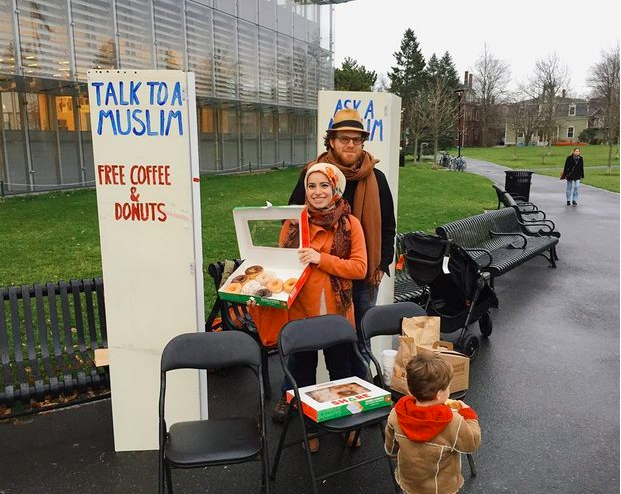
Photo: Courtesy of Mona Haydar
In the age of cellphones and social media, it’s very easy to disconnect from people without realizing you’re doing so. How many of us create walls subconsciously, especially if it concerns people of different nationalities we don’t usually associate with?
I was struck by a story of a woman who decided to set up a stand outside of a library in Cambridge, MA. Inspired by a story her husband saw on NPR titled “Ask an Iraqi”, Mona Haydar thought that it was important for her to establish a connection with those who may not know what’s it’s like to be a Muslim, especially a Muslim woman living in the United States.
For Haydar, setting up a stand titled “Talk To A Muslim” was a way for her to dispel any preconceived notions or stereotypes so many have of foreigners, especially of Muslim women.
With so many crises affecting different nationalities, in light of events happening in Syria, Haydar’s goal of creating a physical stand and waiting for people to approach her was a bold move since she had no clue how it would be received. What was surprising and hopeful was that people did stop by and spoke with Haydar, and that was a start. She was quite surprised to see how people did respond to her stand and while the reception was initially uncertain, it was enough for her to think about setting up the stand again.
In the current climate regarding people of cultures we aren’t familiar with, not willing to find out about them says more about us than them. There shouldn’t be a division of “them” and “us”, but unfortunately, there is.
How many times have we been guilty of giving in to fear of the unknown instead of taking a step back and dispelling the stereotypes we have learned about other cultures?
As someone who has had to answer questions about my nationality or religion over the years, the initial offense I felt has made me rethink of how people perceive me. Over the years, I have been mistakenly identified as either Korean or Japanese, rarely a Filipina. In addition, since I’m married to a Jewish man, I have been asked whether I’m a convert or adopted due to my Jewish maiden name, and to which I answer “no” to both. Answering these questions over the years, my frustration over being categorized primarily due to my physical appearance has made me realize that it’s not because of ignorance, but lack of communication. Asking questions and conversing about each other’s cultures would go a long way than being presumptuous about other people’s lives.
After reading about Haydar and seeing the NPR segment titled “Ask An Iraqi”, it made me wonder if we should put ourselves in Haydar’s shoes. Should we have to set up a stand in order to be understood or be compassionate towards others? Have we become so desensitized by our own prejudices that we have no room for being tolerant? I would hope not. Haydar’s stand may just be one form of starting conversations regarding one’s culture, but I think it’s an idea worth exploring. We might just realize that we may not look alike, but we all share the same intrinsic values of goodness towards humanity.
Read the original article regarding this post Here.
How do you think we can nurture better cross-cultural understanding?
This is an original post written by World Moms Blog Contributor Tes Silverman of The Pinay Perspective
World Moms Blog is an award winning website which writes from over 30 countries on the topics of motherhood, culture, human rights and social good. Over 70 international contributors share their stories from around the globe, bonded by the common thread of motherhood and wanting a better world for their children.
World Moms Blog was listed by Forbes Woman as one of the "Best 100 Websites for Women 2012 & 2013" and also called a "must read" by the NY Times Motherlode in 2013. Our Senior Editor in India, Purnima Ramakrishnan, was awarded the BlogHer International Activist Award in 2013.
More Posts

by Nadege Nicoll | Dec 11, 2015 | 2015, Being Thankful, Caring, Family, Helping, Inspirational, Life Lesson, Nadege Nicoll, North America, USA, World Motherhood
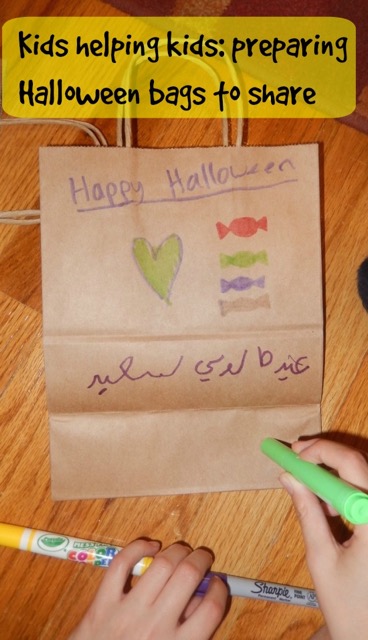
Decorating Halloween bags to fill and share with Syrian children.
It was a few weeks ago, my phone rings. I am working from home, writing something unimportant. Yet, I am hesitant to interrupt my concentration. No matter how insignificant my work assignment is, at that precise moment, it’s the center of my universe. While I’m toying whether I should pick up or call back later, my hand lifts the phone. Or maybe it’s not my hand. Maybe it’s instinct, a force, my conscience. Something bigger than me, that knows this phone call is about to rock my world. (more…)
Nadege Nicoll was born in France but now lives permanently in New Jersey with her family. She stopped working in the corporate world to raise her three children and multiple pets, thus secretly gathering material for her books. She writes humorous fictions for kids aged 8 to 12. She published her first chapter book, “Living with Grown-Ups: Raising Parents” in March 2013. Her second volume in the series just came out in October 2013. “Living with Grown-Ups: Duties and Responsibilities” Both books take an amusing look at parents’ inconsistent behaviors, seen from the perspective of kids. Nadege hopes that with her work, children will embrace reading and adults will re-discover the children side of parenthood. Nadege has a few more volumes ready to print, so watch this space…
More Posts - Website
Follow Me:



by Marie Kléber | Dec 7, 2015 | 2015, Awareness, Childhood, Culture, Death and Dying, Education, Europe, France, Gun Violence, Identity, Life, Life Lesson, Media, Motherhood, News, Parenting, Peace, Respect, Responsibility, School, Stress, Terrorism, World Motherhood
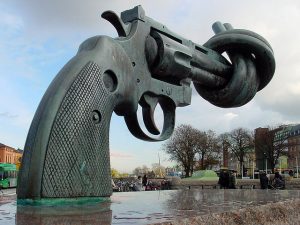 …and prevention is protection.
…and prevention is protection.
Now-a-days, we hear a lot about violence. Violence at home, bullying at school, harassment at work or on the street. Violence is everywhere. It does not define our societies or who we are but it plays an important role in our evolution and how we decide to define ourselves.
In the past couple of years, the French government put into place important measures to fight all types of violence, creating adds to show its impact on peoples lives, opening more helplines, dedicated centres to welcome the victims, creating new jobs and training programs. Many well-known artists took it over and started campaigns around the country and in the world.
Still, I think something is missing in order, if not to eradicate violence completely, at least to change the vision of men and women on the subject and prevent violence from spreading even more. Before discussing the impact of violence, people first have to be educated on what violence is, how to spot it and how to protect themselves from it.
We tend to think that violence is only physical. Is it something we learn as kids? Or are the other forms of violence too cruel to be true?
I met women who kept telling me that in their case, it was not violence. I met kids who kept telling me that other kids were just laughing at them, no big deal. I met men who kept telling me that if their bosses were that mean towards them, it was maybe because they were not that good.
If people don’t know or understand that the relationship they are in is poison, they won’t be able to get out of it or ask for help. And it will keep destroying them. Ads or campaigns won’t have any impact on their life. They will still think violence is horrible but they will think it has nothing to do with them.
I suppose we have to educate people from a young age. Maybe school is the first place to start, as violence can take root there for many. Teaching kids about respect and differences. Teaching them about what is not allowed, about their body and about the importance of equality. Boys are not better than girls and girls are not better than boys.
But first, we have to teach kids about confidence. In most cases, it’s the lack of confidence that takes people down. Teaching kids that they are important, that they are valued and loved, that they are worth it, beautiful, enough. I think this is crucial and it can change many things in our world these days.
I don’t say that confident people can’t be touched by violence, but they’ll have the resources, the power to face it and say stop to it. Or they’ll know something is wrong in the equation and they’ll be able to talk about it, to raise their voice.
Because, at the end of the day, silence is really the enemy, silence is what allows violence to thrive.
This is an original post from our contributor in France, Marie Kleber.
The image used in this post is attributed to Cyber Magic. It holds a Flickr Creative Commons attribution license.
Marie is from France and is living near Paris, after spending 6 years in Irlande. She is a single mum of one, sharing her time between work, family life and writing, her passion. She already wrote 6 books in her native langage.
She loves reading, photography, meeting friends and sharing life experiences. She blogs about domestic abuse, parenting and poetry @https://mahshiandmarshmallow.wordpress.com
More Posts - Website

by Ann Marie Wraight | Nov 30, 2015 | 2015, Advice, Awareness, Being Considerate, Being Thankful, Caring, Childhood, Death and Dying, Europe, Gratefulness, Greece, Grief, Identity, Life, Life Lesson, Memories, Motherhood, Parenting, Relationships, Responsibility, Tragedy, World Motherhood, Younger Children
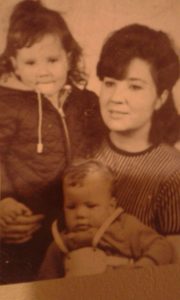
The last photo of the author and her brother with their mom.
There once was a little girl who lost her mother. She was too young to fully understand the concept of never. She had a secret belief that people were making a silly mistake when they gently explained that her mommy would never be coming home again.
The little girl secretly believed her mommy had just taken a long vacation. Her Daddy told her that Mommy was in a special type of hospital for people who were sick and needed to rest.
Since the little girl was smart and precocious, she imagined her mother had taken a much needed rest and gone on holiday with the traveling circus, which recently had been in town. Hadn’t Mommy admired the clowns and acrobats SO much? Wouldn’t this be a great way to get better after all the medicine the little girl had secretly seen her mommy take when she thought nobody was watching…
As the months and then years dragged on and Mommy didn’t come back, the girl started to realise that the traveling circus probably wasn’t the reason her mother had left.
Instead, she started to suspect that her parents had gotten a divorce and her father had custody of the 2 children since his wife was sick. This had happened to a boy in the little girl’s class at school.
She still couldn’t accept the fact her mother was gone for good.
Things began to get difficult at home and at school too. At first the other children were sympathetic because their teacher had told them that the little girl was going through difficult times at home and needed help and understanding from her classmates.
Eventually though, when the girl started coming to school with untidy hair and wearing grubby, mismatched socks, most of the kids started calling her names and telling her she was a freak.
She DID look and act weird, she knew. The sad truth was that she FELT like a freak, and that was even worse.
When other girls went on sleepovers and to birthday parties, on shopping trips and visits to the local swimming pool with their moms, the little girl wasn’t invited. The mothers felt awkward and embarrassed trying to organise these things with the girl’s father. The father said he needed his daughter to stay home and look after her little brother and he couldn’t spare her as he had to work. After a few kind attempts, the invitations dried up.
Although help was offered to the father at first, his depressed and confused mental health gradually repelled those who were trying to help him support his 2 young children. After losing all of his teeth and most of his hair due to extreme stress, he realised he couldn’t cope alone anymore. He suffered a nervous breakdown and was forced to go back to his country of origin to seek help from estranged relatives.
This is the traumatic beginning of my early life and the reason I lived in a fantasy world following the death of my mother, when I was just six years old.
My family had left England a few years earlier and gone to live in Australia for a better life. We really did have a perfect lifestyle for a couple of years until my beloved mother became sick and died of cancer before the age of 30.
I remember with utmost shock how I refused to believe my mother was actually dead. I’m staggered now at how I stubbornly clung to elaborate fantasies about her REAL whereabouts and my utter refusal to grasp reality.
The other thing I remember with clarity is the nastiness of some and the true kindness of others.
Although virtually everyone was supportive and helpful at first, this really didn’t last long. After a relatively short period of time, I became an object of ridicule and target for bullies. My father was going through his own catastrophic demise and I basically had to fend for myself as well as bring up my younger brother.
It’s not easy for a 6-and-a-half-year-old to cook, clean and look after herself and her 4-year-old brother as well.
I went to school looking unkempt and bedraggled most of the time and the fantasies I told about my mother must have scared my schoolmates, who knew she had passed on. I was called names and kids threw stones at me because I was so different from them. In my class I was the only one from a single-parent home at that time.
Nowadays, of course, single-parent families are commonplace. Back then it wasn’t the norm and other kids made me feel that somehow it was my fault; I was stigmatized.
Coming from another country and speaking with a different accent didn’t help either. I was unacceptably different on so many levels.
When I first met my Greek husband decades later, one of his relatives praised him for being such a good Christian, offering to marry not only a foreigner but an orphan too!!!
It seems that in many cultures the child is responsible and pays for the parents “crimes.”
I remember a limited amount of kindness during my formative years and so try my best to instill a sense of compassion and respect for ALL living things in my children. I tell them that it really doesn’t matter how many possessions a person has that gives them value but how they treat others that counts. The way they interact with others is the true measure of their worth.
As a result of my childhood, I know that the kindness and compassion we show to a person can shape their whole future, for better or worse.
If we could all impart this wisdom in our children, wouldn’t the world be such a better place?
Have you had any childhood traumas that have made you passionate about something in adulthood? How do you encourage your kids to show kindness to others?
This is an original post to World Moms Blog from our contributor in Greece and mum to two, Ann Marie Wright.
The image used in this post is attributed to the author.

Having lived in 4 different countries, Ann Marie finds it difficult to give a short answer about where she's from. She regards herself: Brit by birth, Aussie by nature, with a sprinkling of Greek and German based on her insatiable appetite for tasty food and chilled beer!
This World Mom has been married to her Greek soulmate for 16 years and they are the proud but constantly challenged parents of two overactive teenage boys. (She secretly wonders sometimes if she was given the wrong babies when she left the maternity clinic.) She can't explain the fascination and ability that her 13 and 14 year-olds show in math and physics or that both boys are ranked 1st and 2nd nationally in judo. Ann Marie can only conclude that those years of breastfeeding, eating home cooked meals and home tutoring really DO make a difference in academic and physical performance! The family is keeping its fingers crossed that---with the awful economic crash in Greece---continued excellence in math and/or judo will lead to university scholarships...
In addition to writing, enjoying a good glass of wine and movies, Ann Marie also works as a teacher and tends their small, free-range farm in the Greek countryside.
More Posts
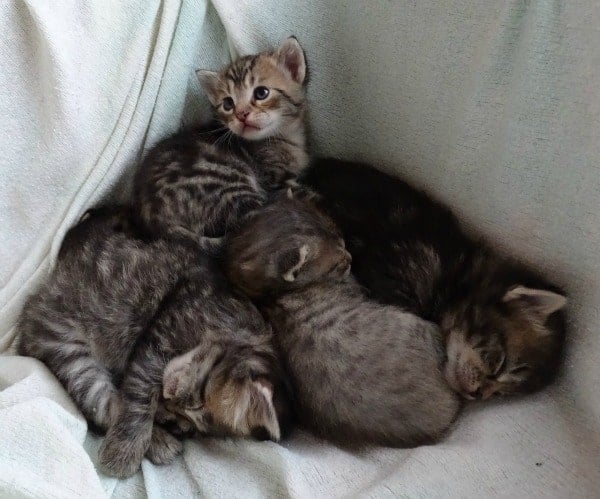
by Tina Marie Ernspiker | Nov 27, 2015 | 2015, Kids, Life Lesson, Living Abroad, Mexico, North America, Parenting, World Motherhood, Younger Children

As a wife of one and a mom of four, it seems like I am always learning and discovering! I know I am not alone. It doesn’t matter where we live, let’s just admit it:
The world is a big place, life is a lesson, and children can be the best teachers.
Here are my most recent insights and experiences as a Mexico Mom: (more…)

 I used to visit the library every chance I had. It was my favorite place in the world. I loved its quiet atmosphere, the air thick and warm with stories, knowledge, wisdom, all ready to be discovered in hundreds of books.
I used to visit the library every chance I had. It was my favorite place in the world. I loved its quiet atmosphere, the air thick and warm with stories, knowledge, wisdom, all ready to be discovered in hundreds of books.





















